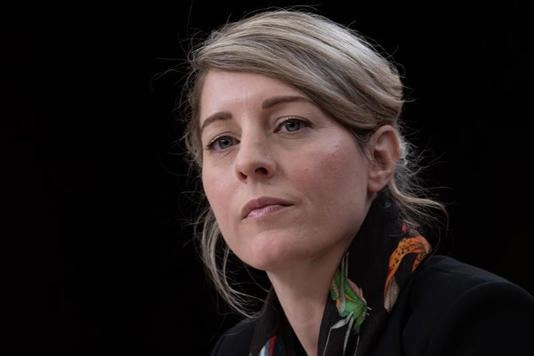
The Canadian Press
OTTAWA — A group of foreign ministers from the Palestinian Authority, Saudi Arabia and Turkey met Saturday in Ottawa with Foreign Affairs Minister Mélanie Joly and Prime Minister Justin Trudeau to discuss the Israel-Hamas war.
The quietly planned meeting focused on ways countries could help efforts to secure peace for Palestinians and Israelis, after Hamas militants launched a deadly rampage in Israel on Oct. 7.
Joly hosted the delegation, which calls itself the Arab-Islamic Extraordinary Summit. The group normally includes Jordan, though Joly’s office says that country needed to send its foreign minister on other business.
The group is not a joint peace project with Israel, and says its leaders aim to speak on behalf of Arab and Muslim people following Israel’s bombardment of Gaza in responseto the Hamas attack.
Trudeau joined the meeting in Ottawa towards its conclusion. His public itinerary for Saturday had originally said only that he was holding private meetings in the National Capital Region. His itinerary was updated to note his presence at the summit with Joly after the fact. The media was not provided with the location of the meeting.
The meeting marked the first visit to Canada by Saudi Arabia’s foreign minister since a diplomatic chill over human rights issues in 2018, when Riyadh recalled its ambassador from Ottawa and expelled Canada’s envoy.
Joly’s office said the ministers discussed political pathways to a comprehensive and lasting peace, with an emphasis on “self-determination, human rights, and security for Palestinians and Israelis alike.”
The ministers also discussed the need to allow much more humanitarian aid into the Palestinian territory.
The delegation visited Ottawa after travelling to Washington, with the group having met withthe five members of the UN Security Council and the European Union presidency holder, Spain.
The group of ministers had previously visited the capitals of China, France, Russia, Britain and the U.S., as well as Spain.
Trudeau has said that Israel has a right to defend itself, while arguing that acts such as the “killing of women, of children, of babies” in Gaza undermines the possibility of a two-state solution, where Israel and a Palestinian country could live peacefully beside each other.
That would follow a 1993 plan known as the Oslo Accord that was endorsed by Israel and the Palestinian Authority, which rules the West Bank but not Gaza. Hamas has not supported the accord.
The Canadian government says Hamas must release its hostages and that all foreigners must be allowed to leave the Gaza Strip, though Global Affairs Canada has stopped publishing the number of Canadians it believes are still in the besieged territory.
Approximately1,200 people, mainly civilians, were killed during Hamas’s attack and 240 people were taken hostage. It’s believed that militants are still holding more than 130 people, including one Canadian woman.
Israel and Hamas negotiated the release of 110 hostages taken from Israel in exchange for Palestinian prisoners during a weeklong truce. Both sides blame each other for the resumption of hostilities.
Gaza’s health ministry, which is controlled by Hamas, said the death toll in the territory has surpassed 17,400, including combatants.
The ministerial committee that visited Canada has stressed the need for an immediate stop to “military escalation” in Gaza, and to propel the political process forward with the goal of lasting peace.
UN Secretary-General Antonio Guterres said Gaza is at “a breaking point,” with the humanitarian support system at risk of total collapse.
Guterres used a rare power this week to call for a ceasefire, in a move the U.S. vetoed at the Security Council. Israel has argued an immediate ceasefire would only help Hamas prepare for more violent attacks, and says its priority is to remove the group’s capacity to inflict mass violence against Israelis.
The Associated Press reported Saturday that Israeli warplanes were striking parts of the Gaza Strip that include some of the dwindling bits of land Israeli officials told Palestinians to evacuate to, in the south of the territory. That has left Palestinians huddling on a narrow patch of barren coastline.
Joly has said that negotiations between Israel and Hamas are needed to end the conflict, though Canada has not followed some European countries in calling for an immediate ceasefire.
The Palestinian Authority is the internationally recognized body that speaks for Palestinians, including in negotiations aimed at a two-state solution. The group controls the West Bank but was driven out of Gaza by Hamas when it seized power in 2007.
Canada has no relations with Hamas, which it has deemed a terrorist organization since 2002, and so it cannot negotiate with the group.
In May, Canada and Saudi Arabia agreed to restore ambassadors in each other’s capitals, after a 2018 spat sparked by Canada’s loud condemnation of the kingdom’s human-rights record.
That year, Canada called on Saudi Arabia to release its detained women’s rights and democracy activists. Riyadh responded by pulling its ambassador and freezing new trade with Canada.
This report by The Canadian Press was first published Dec. 9, 2023.
With files from The Associated Press
Source: Dylan Robertson, The Canadian Press
